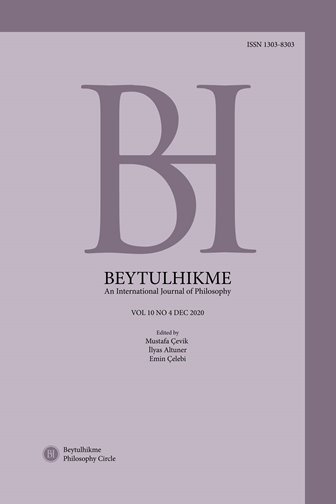Author :
Abstract
Akademik şüphecilik Platonculuk tarihinde önemli bir rol oynar. Akademi'nin şüpheci dönüşünü ve Akademik şüpheciliğin felsefi değerini anlamak için çeşitli girişimlerde bulunulmuştur. Ancak, Platon'un haklı bir yorumu olarak Akademik şüpheciliğin meşruiyeti henüz anlaşılamamıştır. Bu makale, akademik şüpheciliğin Platon'un ne derecede makul bir okuması olarak değerlendirilebileceğini incelemektedir. Bu amaçla Cicero'nun Academica'sı Akademik şüphecilik ile muhalifleri arasındaki ilişkiyi araştırmak için kullanılacaktır. Bulgular, Akademik şüpheciliğin değerli bir Platonik hareket olarak ihmalinin kısmen Platon'un eserlerinin tek taraflı okunmasından, kısmen de Antiokhus'un Platonculuk tarihinin önyargılı ve polemikçi olmasından kaynaklandığını göstermektedir. Sonuç olarak, bu makale, Yeni Akademi’nin şüpheci okumasının Platon’u anlamada akademisyenlere yardımcı olmak için eşsiz ve değerli bir rehber olabileceğini belirtir.
Keywords
Abstract
Academic skepticism plays a key role in the history of Platonism. Several attempts have been made to understand the skeptical turn of Academy and the philosophical merits of Academic skepticism. However, the legitimacy of Academic skepticism as a justifiable interpretation of Plato has yet to be understood. This paper explores the degree to which Academic skepticism can be considered as a reasonable reading of Plato. To this aim, Cicero’s Academica will be used to explore the relationship between Academic skepticism and its critics. The findings show that the negligence of Academic skepticism as a valuable Platonic movement is partly because of the one-sided reading of Plato’s works and partly because Antiochus’ history of Platonism is biased and polemical. In conclusion, this paper implies that the New Academy’s skeptical interpretation provides a unique and valuable guide to assist scholars in understanding Plato.
Keywords
- Annas, J. (1992). Plato the Sceptic. Methods of Interpreting Plato and His Dialogues. (Eds. J. C. Klagge & N. D. Smith). Oxford: Clarendon Press, 43-72.
- Annas, J. & Barnes, J. (1985). The Modes of Scepticism: Ancient Texts and Modern Interpretations. Cabridge: Cambridge University Press.
- Bett, R. (2006). Socrates and Skepticism. A Companion to Socrates. (Eds. S. Ahbel- Rappe & R. Kamtekar). Oxford: Blackwell Publishing, 298-311.
- Bonazzi, M. (2012). Antiochus and Platonism. The Philosophy of Antiochus. (Ed. D. Sedley). Cambridge: Cambridge University Press, 307-333.
- Burnyeat, M. (1980). Can the Sceptic Live his Scepticism? Doubt and Dogmatism: Studies in Hellenistic Epistemology. (Eds. M. Schofield, M. Burnyeat & J. Barnes). Oxford: Clarendon Press, 20-53.
- Cicero, M. (2006). On Academic Scepticism. (Trans. C. Brittain). Indianapolis: Hackett Publishing Company.
- Cooper, J. (2004). Arcesilaus: Socratic and Sceptic. Knowledge, Nature, and the Good. (Ed. J. Cooper). Princeton: Princeton University Press, 81-103.
- Hankinson, R. J. (1995). The Sceptics: The Argument of the Philosophers. London & New York: Routledge.
- Long, A. A. (2006). From Epicurus to Epictetus: Studies in Hellenistic and Roman Philosophy. Oxford: Clarendon Press.
- Long, A. & Sedley, D. (1987). The Hellenistic Philosophers, vol. 1: Translations of the Principle Sources with Philosophical Commentary. Cambridge: Cambridge University Press.
- Polito, R. (2012). Antiochus and the Academy. The Philosophy of Antiochus. (Ed. D. Sedley). Cambridge: Cambridge University Press, 31-54.
- Rowe, C. (2007). Plato and the Art of Philosophical Writing. Cambrige: Cambridge
- Sedley, D. (2012). Antiochus as Historian of Philosophy. The Philosophy of Antiochus. (Ed. D. Sedley). Cambridge: Cambridge University Press, 80-103.
- Striker, G. (1980). Sceptical Strategies. Doubt and Dogmatism: Studies in Hellenistic Epistemology. (Eds. M. Schofield, M. Burnyeat & J. Barnes). Oxford: Clarendon Press, 54-83.
- Tarrant, H. (2000). Plato’s First Interpreters. Ithaca: Cornell University Press.
- Thorsrud, H. (2010). Arcesilaus and Carneades. The Cambridge Companion to Ancient Scepticism. (Ed. R. Bett). Cambridge University Press, 58-80.
- Vlastos, G. (1991). Socrates: Ironist and Moral Philosopher. Cambridge: Cambridge
- Vlastos, G. (1994). Socratic Studies. Cambridge: Cambridge University Press.
- Woodruff, P. (1992). Plato’s Early Theory of Knowledge. Essays on the Philosophy of Socrates. (Ed. H. H. Benson). Oxford: Oxford University Press, 86-106. Öz: Akademik şüphecilik Platonculuk tarihinde önemli bir rol oynar. Akademi’nin şüpheci dönüşünü ve Akademik şüpheciliğin felsefi değerini anlamak için çeşitli girişimlerde bulunulmuştur. Ancak, Platon’un haklı bir yorumu olarak Akademik şüpheciliğin meşruiyeti henüz anlaşılamamıştır. Bu makale, akademik şüpheciliğin Platon’un ne derecede makul bir okuması olarak değerlendirilebileceğini incelemektedir. Bu amaçla Cicero’nun Academica’sı Akademik şüphecilik ile muhalifleri arasındaki ilişkiyi araştırmak için kullanılacaktır. Bulgular, Akademik şüpheciliğin değerli bir Platonik hareket olarak ihmalinin kısmen Platon’un eserlerinin tek taraflı okunmasından, kısmen de Antiokhus’un Platonculuk tarihinin önyargılı ve polemikçi olmasından kaynaklandığını göstermektedir. Sonuç olarak, bu makale, Yeni Akademi’nin şüpheci okumasının Platon’u anlamada akademisyenlere yardımcı olmak için eşsiz ve değerli bir rehber olabileceğini belirtir. Anahtar Kelimeler: Şüphecilik, akademik şüphecilik, Platonculuk, Eski Akademi, Academica.





